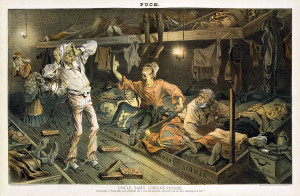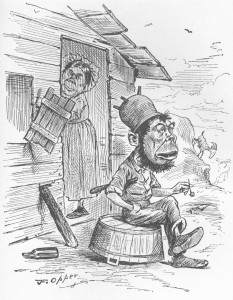People who rail against immigrants and minorities these days would do well to study up on their American history. Take for example the case of the Irish. Today the descendants of Irish immigrants constitute one of the most prosperous (second only to Jewish Americans) and powerful ethnic groups in America. But there was a time in the United States when Irish immigrants were feared and despised as a threat to all things American–from democracy, equality, and sobriety, to law and order and Protestantism.
Below you will find a collection of statements about the Irish made by native-born Americans in the mid-nineteenth century. Make sure you scroll all the way to the end to see a compelling list of statistics on Irish criminality, poverty, and ill-health.
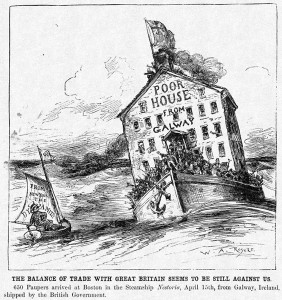
The image of the Irish as hopelessly poor and a burden to the US is captured in this image of a “Poor House from Galway” heading for America.
The Irish as Increasing Poverty
“We, as a people, are intolerant of ragged garments and empty paunches. We are a people who have had no experience in physical tribulation. As a consequence, the ill-clad and destitute Irishman is repulsive to our habits and our tastes. We confound ill-clothing and destitution.”
— The Christian Examiner, 1848
The Irish as a Criminal Element
“We have for nearly a quarter of a century been receiving several thousand Irishmen annually among us. We have given them land — almost for nothing; employment at far better wages than they could have obtained at home; and political rights equal to those which are enjoyed by the sons of the best and noblest Americans. They have come to us steeped in ignorance and superstition; we have let them have their priests and their churches, and when fanatic Protestants have tried to disturb them, we have resisted it, and have successfully protected them in what we believe to be a mistaken course. They have so behaved themselves that nearly seventy-five per cent of our criminals and paupers are Irish; that fully seventy-five per cent of the crimes of violence committed among us are the work of Irishmen; that the system of universal suffrage in large cities has fallen into discredit through the incapacity of the Irish for self-government; yet we have never countenanced any invidious legislation against them, have never thought of depriving them of the political rights they abused, have never sought to protect ourselves against their misconduct.”
— Harper’s Weekly — Oct. 20, 1860
“Thousands are the children of poor foreigners who have permitted them to grow up without school, education, or religion. All the neglect and bad education and evil example of a poor class tend to form others, who, as they mature, swell the ranks of ruffians and criminals. So, at length, a great multitude of ignorant, untrained, passionate, irreligious boys and young men are formed who become the ‘dangerous class’ in their city.”
— Charles Loring Brace, Protestant minister and founder of the Children’s Aid Society, excerpt from his book, The Dangerous Classes of New York and Twenty Years’ Work Among Them (1872) (NOTE – Brace is talking about the Irish here)
The Irish as Bearers of Disease
“They [The Irish] have brought the cholera this year and they will always bring wretchedness and want. The boast that our country is the asylum for the oppressed in other parts of the world is very philanthropic and sentimental, but I fear that we shall before long derive little comfort from being the almshouse and the place of refuge for the poor of other countries.”
— Philip Hone (wealthy businessman and Mayor of NYC, 1826-1827), August 1832, in the midst of a major cholera epidemic linked to Irish immigrants.
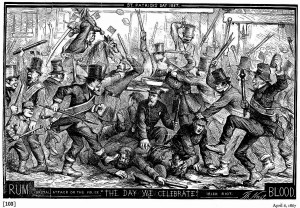
Famed political cartoonist frequently depicted the Irish as violent ape-like beasts for Harper’s Weekly. Here he portrays a St. Patrick’s Day parade.
The Irish as Spreaders of Vice and Disorder
“The vice and drunkenness among the lowering laboring classes is growing to frightful excess, and the multitudes of low Irish Catholics … restricted by poverty in their own country run riot in this … as long as we are overwhelmed with Irish immigrants, so long will the evil abound.”
— John Pintard (NYC merchant and philanthropist), 1841
The Irish as Corrupting American Democracy
“The average Catholic Irishman of the first generation, as represented in the [New York State] Assembly … [is a] low, venal, corrupt, and unintelligent brute.”
— Theodore Roosevelt, ca. 1885
“[W]hen a Catholic Irishman, leader of the Irish Catholic party, announces and boasts that he will decide political conflicts in this neighborhood as suits his good pleasure by means of the good suffrages of thirty thousand Irish Catholic voters upon whom he can count, the people have an opportunity to see just what sort of an institution the Catholic church is in politics and to understand what a farce it would be to pretend that free government can continue where it is permitted to touch its hand to politics, or, indeed, to exist, for where it exists, it will not leave politics alone. This is a Protestant country and the American people are a Protestant people.”
— NY Herald, October 24, 1880 (quoted in Griffen, p. 268)
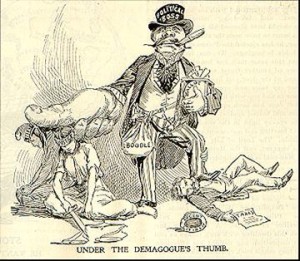
The Irish politician as the corrupt “boss” of an urban political machine like New York’s Tammany Hall
“We in this city have got to submit to be ruled by the dregs and outcasts of Ireland. Men who know not a letter of the alphabet, who have been in this country 1 mo. Or 6 days … decide who shall represent us in Congress.”
— a New Yorker in 1834
“Tammany’s … official and administrative criminality … is filthifying our entire municipal life, making New York a very hotbed of knavery, debauchery, and bestiality… while we fight iniquity they shield or patronize it; while we try to convert criminals they manufacture them.”
— Rev. Charles Parkhurst, 1892
Note – Tammany is the Irish-dominated political machine
“Tammany Hall bears the same relation to the penitentiary as the Sunday-school does to the church.”
— 1876 (from Carruth, Giant Book of Quotations 409)
Note – Tammany is the Irish-dominated political machine
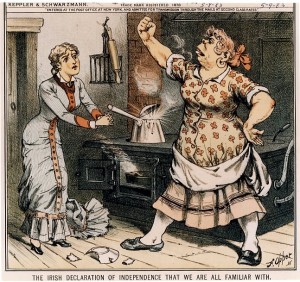
An Irish domestic servant depicted as brutish, violent, and incompetent. “The Irish Declaration of Independence That We Are All Familiar With,” Puck, May 9, 1883.
The Irish as Unwanted Labor Competition
“The increased emigration from Europe in the late years has operated adversely to the interests of the native laboring and mechanic classes in this city, both by crowding them out of employment, and diminishing the rewards of industry. Needy foreigners accustomed to live upon less than our own countrymen, are enabled to produce articles cheaper and to work for lower wages.”
— Association for the Improvement of the Condition of the Poor, Ninth Annual Report, 1852, p. 22 (quoted in Robert Ernst, Immigrant Life in New York, p. 103)
“WANTED– An English or American woman, that understands cooking, and to assist in the work generally if wished; also a girl to do chamber work. None need apply without a recommendation from their last place. IRISH PEOPLE need not apply, nor anyone who will not arise at 6 o’clock, as the work is light and the wages are sure. Inquire 359 Broadway.”
— classified advertisement in New York newspaper, ca. 1840 (from Ernst, ch 6 fn 40)
The Irish as Possessing an Alien Culture
“I am sorry to find that England is right about the lower class of Irish. They are brutal, base, cruel, cowards, and as insolent as base … my own theory is that St. Patrick’s campaign against the snakes is a Popish delusion. They perished of biting the Irish.”
— George Templeton Strong, wealthy New York merchant, 1863 (from his diary)
“Our Celtic fellow citizens are almost as remote from us in temperament and constitution as the Chinese.”
— George Templeton Strong, wealthy New York merchant, 1863 (from his diary) July 7, 1857
The Irish as “Invaders”
“Suffolk County is only a New England county cork’; Boston is but the Dublin of America.’”
–Theodore Parker, The Material Condition of the People of Massachusetts, 1860 (quoted in Bean, 71)
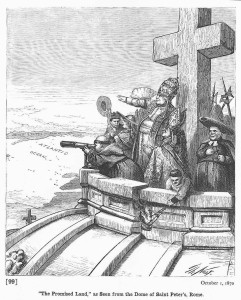
The Pope in Rome looks to overthrow the American republic. Thomas Nast, “The Promised Land” Harper’s Weekly, Oct 1,1870
The Irish as the Vanguard of a Vast Papal Plot to Overthrow the American Republic (note – by “Catholics” these writers are specifically worried about the huge numbers of Irish immigrants, the vast majority of whom in the 1830s and 1840s are Catholic)
“The [Catholic] conspirators against our liberties who have been admitted from abroad through the liberality of our institutions, are now organized in every part of the country … They [Catholics] are already the most powerful and dangerous sect in the country, for they are not confined in their schemes and means like the other sects, to our own borders, but they work with the minds and the funds of all despotic Europe. … We may sleep, but the enemy is awake; he is straining every nerve to possess himself of our fair land. We must awake, or we are lost. Foundations are attacked, fundamental principles are threatened, interests are put in jeopardy, which throw all the questions which now agitate the councils of the country into the shade. It is Liberty itself that is in danger, not the liberty of a single state, no, nor of the United States, but the liberty of the world. Yes, it is the world that has its anxious eyes upon us; it is the world that cries to us in the agony of its struggles against despotism, THE WORLD EXPECTS AMERICA, REPUBLICAN AMERICA, TO DO HER DUTY. … [to] defend ourselves from this new, this subtle attack …
— Samuel F. B. Morse, The Foreign Conspiracy against the Liberties of the United States (New York, 1835)
“[T]he principles of the court of Rome [the Vatican] are totally irreconcilable with the gospel of Christ; liberty of conscience; the rights of man; and with the constitution and laws and of the United States of America … the influence of Romanism [Catholicism] is rapidly extending throughout this Republic, endangering the peace and freedom of our country.”
— Constitution of the American Society to Promote the Principles of the Protestant Reformation, 1840 (New York)
“If we do not provide the [public] schools which are requisite for the cheap and effectual education of the children of the nation, it is perfectly certain that the Catholic powers of Europe intend to make up our deficiency, and there is no reason to doubt that they will do it, until by immigration and Catholic education we become to such an extent a Catholic nation, that, with their peculiar power of acting as one body, they will become the predominant power of the nation, or if not predominant, sufficient to embarass our republican movements, by the easy access and powerful action of foreign influence and intrigue.”
— Rev. Lyman Beecher, in his 1835 booklet, “A Plea for the West.”
Some Stats on the “Irish Problem” in mid-19th century America
[All stats drawn from the appendix to Robert Ernst, Immigrant Life in New York City]
55% of those arrested NYC in the 1850’s were Irish-born
35% of the prostitutes arrested in NYC in 1858 were Irish-born.
70% of all admissions to Bellevue Hospital (NYC’s public hospital) in the 1850s were Irish
85% of foreign-born admissions to Bellevue Hospital (NYC’s public hospital) in the 1850s were Irish
63% of foreign-born admissions to the NYC Alms House (Poor House) 1849-1858 were Irish
56% of all prison NYC Prison commitments in 1858 were Irish-born
74% of foreign-born prison NYC Prison commitments in 1858 were Irish-born
70% of persons convicted of disorderly conduct NYC Courts of Special Sessions, 1859, were Irish-born
74% of persons convicted of drunk and disorderly conduct NYC Courts of Special Sessions, 1859, were Irish-born

